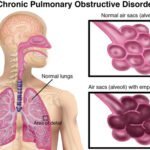
Living with COPD can be a challenge, but understanding the impact of nutrition on this condition and discovering dietary recommendations can make a world of difference. In this article, we explore how nutrition directly affects COPD and whether there are specific dietary guidelines for managing it. By delving into the connection between nutrition and COPD, we can gain valuable insights on how to optimize our diets and improve our overall well-being. So, let’s dive into the world of nutrition and its role in managing COPD.
The Link Between Nutrition and COPD
COPD, or Chronic Obstructive Pulmonary Disease, is a progressive lung disease that can have a significant impact on a person’s quality of life. While there is no cure for COPD, managing the disease through various strategies is essential. One often overlooked aspect of COPD management is nutrition. The link between nutrition and COPD is undeniable, as diet can greatly affect symptom severity and overall health outcomes for individuals with this condition.
Malnutrition and Muscle Wasting
Malnutrition and muscle wasting are common concerns for individuals with COPD. The chronic inflammation and increased energy expenditure associated with COPD can lead to a decreased appetite and weight loss. Inadequate calorie and nutrition intake can result in muscle wasting, which further exacerbates the respiratory symptoms and weakness experienced by COPD patients.
Impact on Lung Function
Nutrition plays a vital role in maintaining overall lung health and function. Adequate nutrient intake, especially protein, is crucial for the repair and maintenance of lung tissues. Malnutrition can weaken the respiratory muscles and compromise lung function, leading to increased shortness of breath and fatigue. Conversely, a well-balanced diet can support lung function and help improve exercise tolerance in individuals with COPD.
Influence on Inflammation and Immune System
The nutritional status of individuals with COPD can significantly influence the body’s inflammatory response and immune system. Poor nutrition can exacerbate inflammation in the airways, leading to the progression of COPD symptoms. On the other hand, a diet rich in anti-inflammatory nutrients, such as antioxidants and omega-3 fatty acids, can help reduce inflammation and support a healthier immune system. This, in turn, may help manage COPD symptoms more effectively.
Dietary Recommendations for COPD Patients
To address the nutritional challenges faced by individuals with COPD, specific dietary recommendations are necessary. These suggestions focus on optimizing nutrient intake to improve overall health outcomes and manage COPD symptoms effectively.
Calorie Intake
Maintaining an appropriate calorie intake is essential for COPD patients, especially in cases where weight loss or malnutrition is an issue. Adequate calorie intake provides the energy needed for daily activities and helps support respiratory muscle function. For individuals with COPD, it is recommended to work with a healthcare professional, such as a registered dietitian, to determine the appropriate calorie intake based on individual needs and goals.
Protein
Protein plays a critical role in muscle repair and maintenance, making it an important nutrient for individuals with COPD. Adequate protein intake can help prevent muscle wasting and weakness, allowing for improved respiratory muscle function. Good sources of protein include lean meats, poultry, fish, eggs, dairy products, legumes, and nuts. It is recommended that COPD patients aim for a higher protein intake, approximately 1.2-1.7 grams of protein per kilogram of body weight per day.
Carbohydrates
Carbohydrates are the body’s primary source of energy, and individuals with COPD should focus on consuming complex carbohydrates, such as whole grains, fruits, and vegetables. These foods provide sustained energy, promote satiety, and contribute to overall health and well-being.
Fats
While a balanced intake of healthy fats is important, individuals with COPD should focus on consuming unsaturated fats, such as those found in olive oil, avocados, nuts, and seeds. These fats have anti-inflammatory properties and can help reduce airway inflammation, which is beneficial for managing COPD symptoms.
Vitamins and Minerals
COPD patients may have increased nutrient needs due to inflammation and oxidative stress. It is crucial to consume a variety of fruits, vegetables, whole grains, and other nutrient-dense foods to ensure an adequate intake of vitamins and minerals. Key nutrients to focus on include vitamin C, vitamin E, beta-carotene, magnesium, and selenium.
Fluid Intake
Staying hydrated is essential for individuals with COPD, as it helps thin mucus secretions and improves lung function. Adequate fluid intake can also prevent dehydration, which may worsen symptoms such as fatigue and shortness of breath. It is recommended to drink water throughout the day and limit the intake of caffeinated and sugary beverages, as they can contribute to dehydration.

Specific Nutritional Considerations
In addition to general dietary recommendations, individuals with COPD should also consider specific nutritional considerations to address their unique needs and challenges.
Weight Management
Maintaining a healthy weight is crucial for COPD patients. While some individuals may need to gain weight, others may benefit from weight loss if they are overweight or obese. A registered dietitian can help assess individual needs and develop a weight management plan that aligns with overall health goals.
Muscle Strength and Endurance
Promoting muscle strength and endurance is essential for individuals with COPD, as muscle weakness can exacerbate respiratory symptoms. Consuming an adequate amount of protein and engaging in regular physical activity, as recommended by a healthcare professional, can help maintain and improve muscle strength and endurance.
Bone Health
Individuals with COPD may be at an increased risk of osteoporosis and fractures due to factors such as reduced physical activity, steroid use, and vitamin D deficiency. Adequate calcium and vitamin D intake, along with weight-bearing exercises, can help support bone health and reduce the risk of osteoporosis in COPD patients.
Cognitive Function
COPD has been associated with cognitive impairment, including difficulties with memory and attention. While the exact mechanism is not fully understood, it is believed that inflammation and oxidative stress may play a role. Consuming a diet rich in antioxidants and omega-3 fatty acids, along with engaging in mental stimulation activities, may help support cognitive function in individuals with COPD.
Meal Planning Tips for COPD Patients
Meal planning is a helpful strategy for individuals with COPD to ensure they meet their nutritional goals and manage their symptoms effectively.
Eat Smaller, Frequent Meals
Instead of consuming three large meals a day, COPD patients may find it beneficial to eat smaller, more frequent meals throughout the day. This approach can prevent feelings of fullness and discomfort, which can make breathing more difficult, especially for those with advanced COPD. Smaller, frequent meals also help maintain a steady energy supply and support weight management goals.
Focus on Nutrient-Dense Foods
Since individuals with COPD have specific nutritional needs, it is important to focus on consuming nutrient-dense foods. Nutrient-dense foods provide a high concentration of vitamins, minerals, and other important nutrients per calorie. This can help maximize nutrient intake and support overall health. Examples of nutrient-dense foods include fruits, vegetables, whole grains, lean proteins, low-fat dairy products, and healthy fats.
Include a Variety of Food Groups
Including a variety of food groups in meals and snacks ensures a diverse range of nutrients and flavors. Aim to incorporate fruits, vegetables, whole grains, lean proteins, and healthy fats into each meal. This not only provides a wide array of nutrients but also helps to keep meals interesting and enjoyable.
Avoid Certain Foods
Some foods may exacerbate symptoms in individuals with COPD and should be avoided or limited. Examples include foods that are high in sodium and can contribute to fluid retention, such as processed meats, canned soups, and fast food. Carbonated beverages and gas-producing foods may also cause bloating and discomfort, making breathing more challenging.
Consider Dietary Supplements
In some cases, dietary supplements may be recommended to ensure adequate nutrient intake. However, it is important to consult with a healthcare professional, such as a registered dietitian, before initiating any supplements. A healthcare professional can assess individual needs and recommend appropriate supplements that align with the individual’s overall health goals and existing medications or treatments.
Nutrition Education and Counseling
Education and counseling about proper nutrition for COPD patients are crucial for successful management of the disease.
Importance of Education
Educating individuals with COPD about the link between nutrition and their condition can empower them to make informed dietary choices. Understanding how nutrition affects symptoms and overall health outcomes can motivate individuals to prioritize their nutrition and take an active role in managing their COPD.
Working with a Registered Dietitian
Registered dietitians are trained professionals who specialize in nutrition and can provide personalized guidance and support for individuals with COPD. Working with a registered dietitian can help individuals develop an individualized meal plan, address specific dietary concerns, and ensure the nutritional goals align with overall health goals.
Tips for Successful Nutritional Therapy
COPD patients can benefit from various strategies to enhance nutritional therapy. These include staying organized with meal planning and shopping, seeking social support from family and friends, and practicing mindful eating. Keeping track of food intake and symptoms can also provide valuable insights and help identify potential triggers or areas for improvement.
Potential Challenges and Solutions
Managing nutrition can pose challenges for individuals with COPD, but there are practical solutions to overcome these obstacles.
Reduced Appetite and Dyspnea
COPD-related symptoms such as shortness of breath and fatigue can affect appetite and make eating challenging. To overcome reduced appetite and dyspnea during meals, individuals can try eating smaller, more frequent meals, focusing on nutrient-dense foods, and using breathing techniques to manage breathlessness. Consulting a healthcare professional, such as a registered dietitian, can provide additional strategies and support.
Difficulties with Grocery Shopping and Food Preparation
Limited mobility and energy levels can make grocery shopping and food preparation challenging for individuals with COPD. Utilizing online grocery delivery services, seeking assistance from family or friends, or considering meal delivery services can help alleviate these difficulties. Additionally, preparing meals in advance or using kitchen appliances that simplify meal preparation can make cooking more manageable.
Financial Constraints
Managing a COPD-friendly diet on a tight budget can be challenging. However, there are cost-effective strategies that individuals can employ, such as planning meals around budget-friendly staples, purchasing frozen fruits and vegetables when fresh options are more expensive, and taking advantage of sales and coupons. Consulting with a registered dietitian can also help identify affordable, nutrient-dense options and prioritize spending.
Social Support
Social support is essential for individuals with COPD to maintain their meal plans and make healthy choices. Engaging with friends and family members, joining support groups or online communities, and seeking professional counseling can provide the necessary social support for managing nutrition and overall well-being.
Conclusion
Nutrition plays a crucial role in the management of COPD. From supporting lung function and reducing inflammation to maintaining weight and muscle strength, a well-balanced diet can have a significant impact on COPD symptoms and overall health outcomes. By following dietary recommendations, incorporating meal planning strategies, and seeking nutritional education and counseling, individuals with COPD can optimize their nutrition and improve their quality of life. It is important to remember that individualized dietary recommendations based on specific needs and goals are essential for effective COPD management. With the support of healthcare professionals and social networks, individuals can navigate the challenges of COPD and thrive in their nutritional journey.










